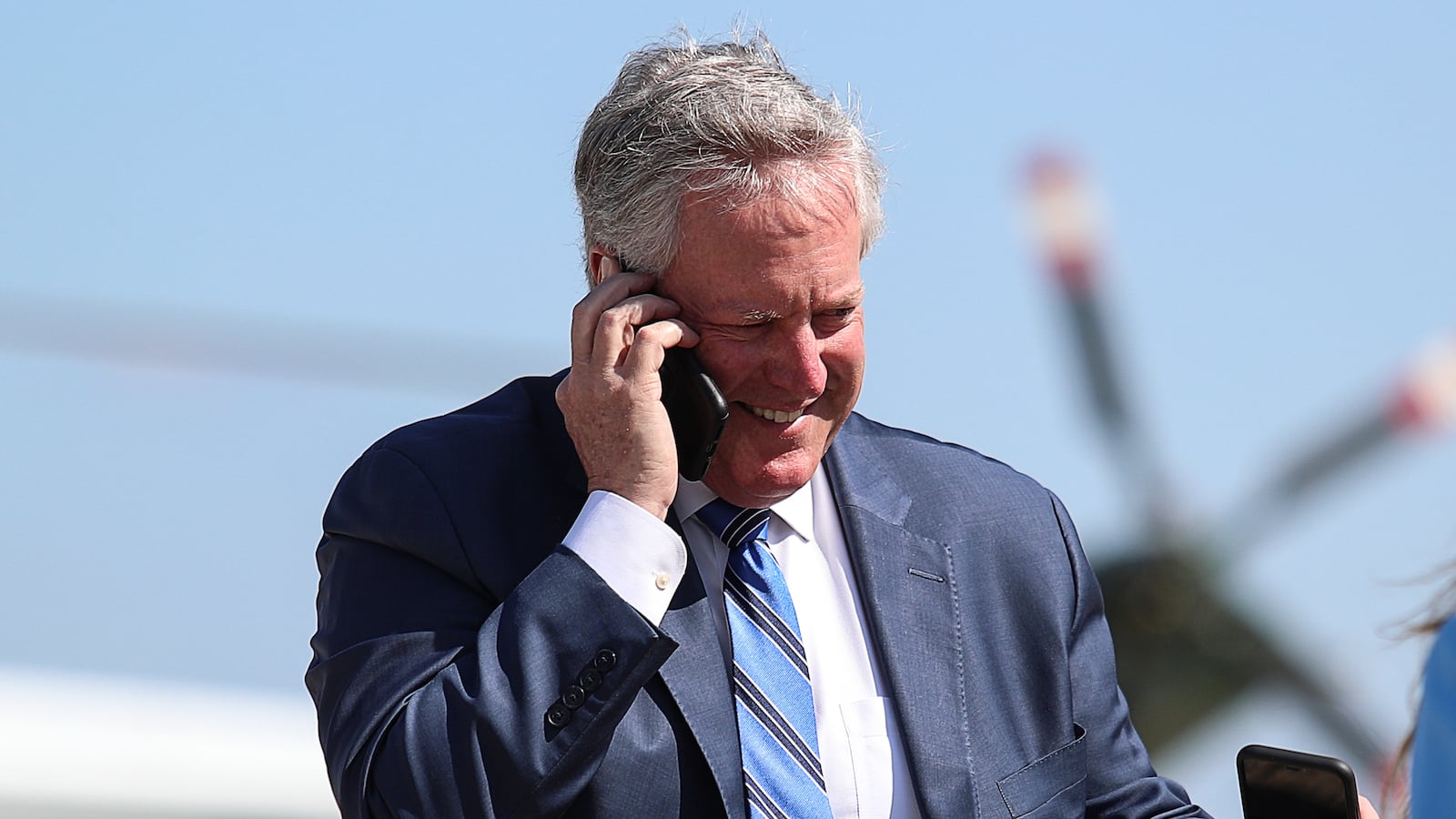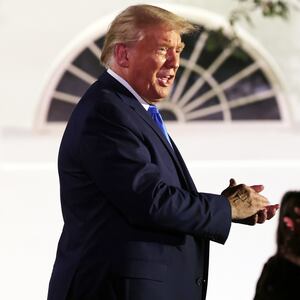White House Chief of Staff Mark Meadows doesn’t believe that anyone in America is concerned about a law that bars members of the Trump administration from engaging in political activities—or about the particularly enthusiastic breaking of that law during the Republican National Convention this week.
“Nobody outside of the Beltway really cares—they expect that Donald Trump is going to promote Republican values and they would expect that Barack Obama, when he was in office, that he would do the same for Democrats,” Meadows told Politico on Wednesday morning, calling concerns by ethics experts “a lot of hoopla.”
But long before joining an administration famous for its casual disregard for the Hatch Act, Meadows was one of the federal law’s biggest supporters. Meadows co-sponsored multiple pieces of legislation intended to strengthen punishments for violations of the law, and was a hawkish investigator of purported Hatch Act violations by minor members of the Obama administration.
The change in position on the legitimacy of the 80-year-old law coincides with the appearance of numerous Trump administration officials on the RNC’s list of speakers, from Secretary of State Mike Pompeo beaming in from a taxpayer-funded trip abroad to acting Secretary of Homeland Security Chad Wolf conducting a naturalization ceremony as part of the convention’s official programming. Ethics watchdogs have expressed concerns that the event, which has featured official government acts like naturalization ceremonies as part of its programming, is less of a political convention than a marathon of Hatch Act violations with patriotic bunting.
“Politics and official action are meant to remain separate,” said Jordan Libowitz, communications director at Citizens for Responsibility and Ethics in Washington, a government accountability non-profit, who called Meadows’ casual dismissal of the Hatch Act “pretty horrifying thought.”
“Imagine someone going before a judge and dismissing the charges against them saying ‘no one cares about drunk driving laws,’” Libowitz said. “The necessity of a law does not go away when your party is in power.”
Meadows told Politico that the Hatch Act is outdated in the context of the coronavirus pandemic, which, he said, has necessitated that the convention be filmed on federal property.
“What it’s really designed to do is to make sure people like myself and others do not use their political position to try to convince other employees, other federal employees, that they need to vote one way, need to register one way or need to campaign in one way,” Meadows said on Wednesday. “We take it on well beyond the original intent of the Hatch Act.”
Meadows’ characterization of the Hatch Act does not comport with the text of the law, which bars most federal employees from engaging in political activity in their official capacity, as well as using public funds for election-related purposes.
But when Democrats were in power, Meadows felt much differently.
In 2014, as a member of the House of Representatives, Meadows condemned April Sands, a former attorney for the Federal Election Committee who resigned after admitting to violating the Hatch Act by posting partisan political messages in support of Obama’s reelection campaign, as well as for participating in a political internet broadcast from within an FEC facility.
“She had to quit and resign because she violated the Hatch Act, which says she was using a government, you know, benefits in terms of actually addressing their political targeting,” Meadows said of the case during a Fox News appearance. “It’s troubling.”
In 2016, Meadows co-sponsored legislation that, in part, sought to make Hatch Act violations subject to both civil and disciplinary action, with penalties including removal from federal service, a five-year ban on federal employment for violaters of the act, and a $1,000 civil penalty. The bill, originally written to reform investigations into retaliation against government whistleblowers, was amended to include the Hatch Act-related provisions after Meadows proposed the amendments.
The next Congress, he co-sponsored identical legislation once more.
The Trump administration has not shared Meadows’ onetime enthusiasm for observing the Hatch Act. In June 2019, the U.S. Office of Special Counsel found that senior White House counselor Kellyanne Conway alone had violated the law dozens of times, calling her a “repeat offender.”
“Conway’s violations, if left unpunished, send a message to all federal employees that they need not abide by the Hatch Act’s restrictions,” wrote Special Counsel Henry J. Kerner at the time.
Judging by Meadows’ response to the letter at the time, that message was loudly received.
“This investigation was a disaster,” Meadows, then still a congressman, said in response, accusing the special counsel’s office of violating Conway’s “constitutional rights” in the investigation. “They should be ashamed.”
That disregard, Libowitz said, has carried over into Meadows’ position in the White House, noting that CREW has filed complaints about the chief of staff’s apparent violation of the Hatch Act during appearances on Fox News in which he endorsed multiple Republican candidates for office.
“While the Trump administration has shown an absolute disregard for ethics laws, nowhere has this been more clear than with Chad Wolf last night,” Libowitz said, referring to Wolf’s participation in a naturalization ceremony as part of the RNC’s official programming. “That is so obviously, blatantly, insultingly a Hatch Act violation that it’s starting to seem like the Trump administration is going out of its way to find new ways to violate the law.”
House Democrats have vowed to investigate the alleged Hatch Act violations at the RNC. During a video press briefing with reporters on Tuesday, House Speaker Nancy Pelosi called those involved in politicking in their official governmental capacity “so unethical.”
“The American people… they know these people are unethical and illegal and doing things outside the law,” Pelosi said.
— with additional reporting by Hunter Woodall






